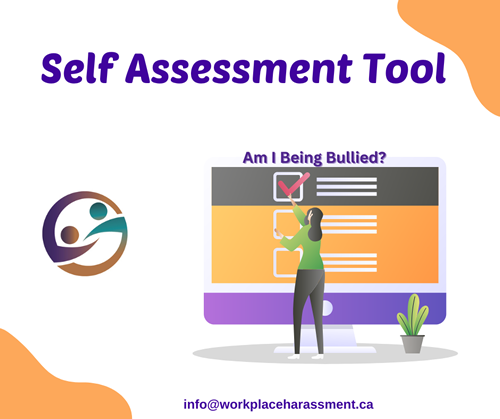This self-assessment tool has been designed to help you evaluate your current situation, manage any feelings of self-doubt you may be experiencing, and to provide you with guidance as you reach out for help.
The Canadian Institute of Workplace Bullying Resources (CIWBR) has designed this self-assessment tool to help you evaluate your current situation, manage any self-doubt you may be experiencing, and guide you as you seek help.
CIWBR defines workplace psychological harassment as follows:
- It encompasses a range of tactics aimed at individuals or groups.
- The person abusing their power uses these harmful tactics over three months or more.
- They can occur with or without conscious intent.
- The primary aim is to cause harm, for example, embarrassment, humiliation, degradation, diminishment, shame, or silencing and isolation of the targeted worker or workers.
- These tactics can take the form of verbal or non-verbal actions, including in-person interactions, written communication, or electronic means directed toward individuals or groups.
Here is some helpful information to consider as you assess your situation and determine your next steps:
- Please familiarize yourself with the definitions in the attached appendix, as they will be valuable when describing your experience.
- Explore the relevant provincial and federal legislation.
- Review your organization’s definitions, policies, and procedures to ensure they align with the OHS Act, which includes provisions for protection against retaliation.
- Understand that making false complaints is considered malicious and may constitute harassment. Visit our website or contact organizations such as OHS, Human Rights, Labour Standards, your Union, or WCB for clarification and information.
Remember, you do not have to face this alone. Experiencing workplace bullying or harassment can be emotionally and physically damaging. Fortunately, solutions are available, regardless of your situation’s complexity.
We acknowledge that shame often silences those targeted. Remaining silent and isolated only empowers those who perpetrate harm. Silence does not hold anyone accountable. It is beneficial and wise to discuss your options with someone who can help you navigate the intricacies of workplace systems and develop a strategy for your situation, including determining your next steps.
Seek a trained, qualified, trauma-informed, experienced professional who understands workplace systems and the injuries targeted workers may sustain. We recommend beginning with a brief assessment/consultation by calling us.
The most effective approach often involves the combined services of an experienced and knowledgeable trauma-informed qualified coach counselor. If you wish to explore this further with an objective and experienced professional, please get in touch with us for a confidential and supportive consultation.
It is important to choose your recovery with or without, justice.
~Linda Crockett


